Verse by Verse (14 vols.)
Digital Logos Edition
Overview
Verse by Verse commentary series by Grant C. Richison exposes the mind of God to the mind of man by expounding individual books of God’s Word verse by verse. Each study includes an exposition, a principle from the exposition, and an application of the principle to experience.
Verse by Verse is a practical, in-depth, and applicable commentary for church leaders. Each volume begins with helpful background information about each book’s author, date, purpose, theme and value. The commentary section is laid out in an easy to follow format. Richison provides commentary on every verse along with a principle that summarizes what the verse means. But Verse by Verse doesn’t stop there, an application section under each verse further illustrates how each principle can be lived out in the reader’s life. Verse by Verse was written to make Christians more aware of what the Bible teaches for their life.
With Logos each volume in the series is fully integrated with the other resources in your library, including Bibles, maps, dictionaries, and other Bible study tools. All Scripture references are linked directly to your preferred translation, making your Bible study and teaching preparations more effective and rewarding. Explore Scripture on a deeper level with search features, passage guides, and the other interactive features in your library. The Logos editions of these important books are more useful than ever for pastors, teachers, leaders, and anyone who wants to get deeper into the truth of God’s Word.

Key Features
- Offers a succinct study that gives you the highest return on your time
- Provides exposition that is accessible to everyone
- Brings the study of Scripture to a practical level
- Enhances personal study by synthesizing a variety of resources
Praise for the Print Edition
Grant Richison has given all pastors and teachers a new tool to mine the wealth of truth in God’s Word. I have always been a proponent of working ‘smarter not harder’ because of the stewardship of my time. When I used ‘Verse by verse’ it literally cut my research time by more than half, not to mention the fact that Dr. Richison has provided access to resources well beyond the volumes on my shelves! While the Word we proclaim never changes, Dr. Richison has provided a new and wonderful tool for our study of it! I believe every serious student of the scriptures who is looking for a portal through which he can have all the necessary resources literally at his fingertips will love Verse by Verse!
—David Uth, senior pastor, First Baptist Church, Orlando, FL
Verse by Verse is fantastic. I would not trust anyone more than Grant Richison to deliver an engaging and biblically astute devotional program. Verse by Verse opens up Dr. Richison’s deep understanding of God’s Word to all Christians, allowing the Bible to truly come alive.
—Leonard Buhler, president, Campus Crusade for Christ, Canada
Grant is passionate about understanding God’;s Word and making it relevant to our lives. He is a man of integrity who practices what he teaches.
—Steve Douglass, president, Campus Crusade for Christ, International
Using sound verse-by-verse exposition Dr. Richison extracts biblical principles that are applied to practical Christian living.
—William E. Nix, president, The Electronic Bible Society
Product Details
- Title: Verse by Verse
- Author: Grant C. Richison
- Series: Verse by Verse
- Publisher: Logos Bible Software
- Volumes: 14
- Christian Group: Evangelical
- Resource Type: Commentaries
- Topic: Biblical Studies
Individual Titles
- Verse by Verse through the Book of Ruth
- Verse by Verse through the Book of Daniel
- Verse by Verse through the Book of Jonah
- Verse by Verse through the Book of Matthew
- Verse by Verse through the Book of 1 Corinthians
- Verse by Verse through the Book of Galatians
- Verse by Verse through the Book of Philippians
- Verse by Verse through the Book of Colossians
- Verse by Verse through the Books of 1 and 2 Thessalonians
- Verse by Verse through the Books of James and Philemon
- Verse by Verse through the Books of 1 and 2 Peter
- Verse by Verse through the Books of 1, 2 and 3 John
- Verse by Verse through the Book of Jude
- Verse by Verse through the Book of Revelation

Verse by Verse through the Book of Ruth
- Author: Grant C. Richison
- Publisher: Logos Bible Software
- Publication Date: 2011
- Pages: 31
Ruth exemplifies God’s grace in the midst of suffering, and in Verse by Verse through the Book of Ruth, Grant C. Richison divides the book of Ruth into four major parts:
- Ruth in Grief
- Ruth’s Service
- Ruth’s Redemption
- Ruth’s Contentment
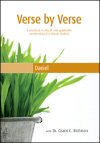
Verse by Verse through the Book of Daniel
- Author: Grant C. Richison
- Publisher: Logos Bible Software
- Publication Date: 2006
Daniel gives hope for the restoration of Israel. The message is that God sustains believers during crisis and it challenges believers to expect God to fulfill his purpose. Daniel reveals the comprehensive program of God culminating in the second coming. It is the most important prophetic book of the Old Testament and is an indispensable introduction to New Testament prophecy. Daniel traces the “Times of the Gentiles” (Luke 21:24) from the captivity of Judah under Nebuchadnezzar to the second advent. It is a prophetic philosophy of history.
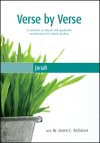
Verse by Verse through the Book of Jonah
- Author: Grant C. Richison
- Publisher: Logos Bible Software
- Publication Date: 2006
Jonah is the picture of God’s grace. The book shows God’s grace reaching beyond the boundaries of Israel to a godless Gentile nation.

Verse by Verse through the Book of Matthew
- Author: Grant C. Richison
- Publisher: Logos Bible Software
- Publication Date: 2011
- Pages: 180
Matthew is not chronological but arranges material from Christ’s life according to an overall argument: Christ is the King of the Jews, rejected by Israel. In Verse by Verse through the Book of Matthew, Grant C. Richison divides the book of Matthew into five major parts:
- Preparation for the King
- Program of the King
- Persecution of the King
- Presentation of the King
- Postlude of the King
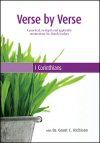
Verse by Verse through the Book of 1 Corinthians
- Author: Grant C. Richison
- Publisher: Logos Bible Software
- Publication Date: 2006
1 Corinthians is Paul’s longest, most diversified letter, and the best picture of life in New Testament churches. It is a correction epistle about an unstable church broken into four factions, allowing immorality, and suing one another. Paul answers Corinthian church questions on marriage, liberty, the Lord’s Table, gifts, resurrection, and giving.
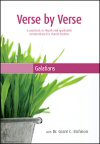
Verse by Verse through the Book of Galations
- Author: Grant C. Richison
- Publisher: Logos Bible Software
- Publication Date: 2006
The book of Galatians shows that law cannot save a sinner nor sanctify a saint. It defends the true gospel and exposes false teaching about the gospel. Galatians shows how the believer fulfills the Christian life by walking in the Spirit.
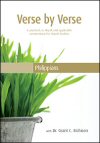
Verse by Verse through the Book of Phillipians
- Author: Grant C. Richison
- Publisher: Logos Bible Software
- Publication Date: 2006
The occasion for the book of Philippians is a conflict between two women (4:1–2) and it is a thank you note from a missionary to a supporting church. There was no extended doctrinal issue, no error to refute. Paul argues that the solution to conflict is to maintain the attitude of Christ (2:5) toward others. The word “attitude” is the key verse of the epistle.
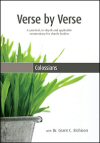
Verse by Verse through the Book of Colossians
- Author: Grant C. Richison
- Publisher: Logos Bible Software
- Publication Date: 2006
The purpose of Colossians is to set forth Christ as preeminent (1:18; 2:9). Jesus is more than an angel, for angels are subject to him. There is no need for any other mediator than Christ (1:18–19), for he is the head of the universal church.
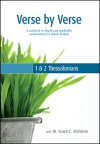
Verse by Verse through the Books of 1 and 2 Thessalonians
- Author: Grant C. Richison
- Publisher: Logos Bible Software
- Publication Date: 2006
First Thessalonians fortifies believers in doctrine and encourages them in holy living. It gives encouragement of the rapture. The book urges respect for leadership and gives instruction in church life.
Second Thessalonians warns about the false idea that Christ had already come in the second coming. Some Thessalonians quit their jobs because of this error. Paul proceeds to give proper criteria to recognize the second coming.
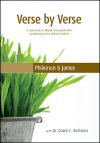
Verse by Verse through the Books of James and Philemon
- Author: Grant C. Richison
- Publisher: Logos Bible Software
- Publication Date: 2006
James exposes the fallacy of dead orthodoxy (profession of faith without producing results). Action must match profession. Right acting must go with right thinking and right believing. We cannot separate doctrine and practice—faith works.
Philemon is Paul’s intercession for a runaway slave to a slave master. This book shows how Christians can mediate and communicate between each other even in interpersonal difficulties.
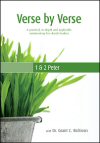
Verse by Verse through the Books of 1 and 2 Peter
- Author: Grant C. Richison
- Publisher: Logos Bible Software
- Publication Date: 2006
1 Peter prepares Christians for suffering by giving principles for living under duress. It enables Christians to face persecution by the grace of God (5:12).
2 Peter warns of apostasy (1:13&ndash14; 2:1–3). It encourages Christians to remember the fundamentals (1:12–21). The main purpose is to help believers grow in grace to be established in the faith (3:18).
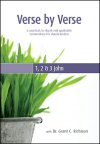
Verse by Verse through the Books of 1, 2, and 3 John
- Author: Grant C. Richison
- Publisher: Logos Bible Software
- Publication Date: 2006
1 John gives assurance of eternal life to those who believe in Christ (5:13). The book motivates readers to cultivate greater fellowship with God (“abide,” “love”). It helps believers to understand standards for fellowship with an absolute God (1:7, 9).
2 John warns about stepping into the domain of false teachers. Abiding in truth is essential for brotherly love.
3 John warns against self-exaltation and self-assumption in leading the local church.

Verse by Verse through the Book of Jude
- Author: Grant C. Richison
- Publisher: Logos Bible Software
- Publication Date: 2011
- Pages: 51
The false doctrine of incipient Gnostic antinomianism weaseled its way into the church, and Jude warns against subversion of the truth and exhorts to “contend earnestly for the faith.” Grant C. Richison divides the book of Jude into six major parts:
- Salutation and Address—Assurance
- Occasion and Purpose—Apostasy
- Apostasy Exposed
- Apostolic Teaching Prevents Apostasy
- Guard Fellowship with God by Honoring His Truth
- Consolation Against Apostasy
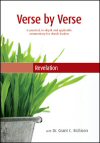
Verse by Verse through the Book of Revelation
- Author: Grant C. Richison
- Publisher: Logos Bible Software
- Publication Date: 2006
Revelation demonstrates God’s sovereignty over the world and history. It gives the final truth about Jesus Christ—the unveiling of his person, power, and purpose (1:1). The book shows the ultimate triumph of the kingdom of Christ and gives a new perspective on history. It gives incentive to holy living and shows that God will ultimately deal with the problem of evil. Finally, it gives a preview of future events and the eternal state.
This title is included in the following collections
You can save when you purchase this product as part of a collection.
2025 Collector's Edition Libra...
$10,999.99$8,249.992025 Ultimate Library
$23,999.99$17,999.99
About Grant C. Richison
Grant C. Richison has been in ministry for the last 41 years. He was the senior pastor of three churches, including one of the fastest growing churches in Canada. Under his leadership there were 500 professions of faith annually. Besides being a pastor, he has also served in other roles, teaching at three Canadian seminaries and participating on several national boards. From, 2002 to 2003, Grant served as the interim president of Campus Crusade for Christ, Canada. Currently, he works as a speaker, writer, and theologian.
Reviews
1 rating